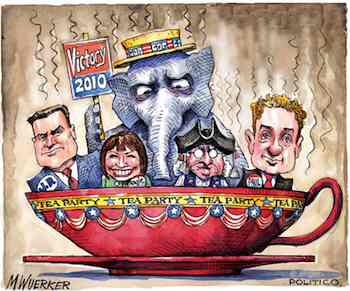- MENU
- HOME
- SEARCH
- WORLD
- MAIN
- AFRICA
- ASIA
- BALKANS
- EUROPE
- LATIN AMERICA
- MIDDLE EAST
- United Kingdom
- United States
- Argentina
- Australia
- Austria
- Benelux
- Brazil
- Canada
- China
- France
- Germany
- Greece
- Hungary
- India
- Indonesia
- Ireland
- Israel
- Italy
- Japan
- Korea
- Mexico
- New Zealand
- Pakistan
- Philippines
- Poland
- Russia
- South Africa
- Spain
- Taiwan
- Turkey
- USA
- BUSINESS
- WEALTH
- STOCKS
- TECH
- HEALTH
- LIFESTYLE
- ENTERTAINMENT
- SPORTS
- RSS
- iHaveNet.com: Politics
by Caitlin Huey-Burns

Tea Party Revolution (© Matt Wuerker)
Author Kate Zernike discusses Sarah Palin, Barack Obama, and the politics of the conservative protest movement
Three days before CNBC commentator Rick Santelli famously stood on the floor of the
Chicago Mercantile Exchange in February 2009 and called for a modern-day Boston Tea Party protest of
President Obama's proposal to help Americans with their mortgages, 29-year-old Keli Carender, feeling
misrepresented by her government, held the first
Grassroots protests like Carender's were what spawned the ,
recently talked about how the
What is the makeup of the
It's an unlikely movement. Certainly polls say it's a movement made up of older people, but it actually starts with young people and, in particular, young conservatives and libertarians, who are all on Twitter.
What are the common misconceptions of the
That everyone is stark, raving mad or crazy. I think everyone thought of the Tea Partyers as sort of angry, white men, and while they do tend to be largely white, I found such a range of perspectives. There were young mothers; there were people in their 20s and 30s without children; and, of course, there were certainly elderly people who felt that in many ways this was a protest against a country they felt they no longer recognized.
What do you make of the criticism that the movement is a group of crazies or extremists?
I think it is a mistake to dismiss the
What can liberals learn from your book?
To not dismiss the
How will the movement impact the new
What do they really think of Sarah Palin?
People assumed Palin was the leader of the
What can Obama learn from this book?
The Tea Partyers are conservative Republicans; these are not people who were ever going to support Obama to begin
with. But I do think that there is a sense, which appeals to people beyond the most hard-core Tea Partyers, of "this government is not listening to me, does not reflect my desires." This was a concern that spoke to a broad swath of Americans. So the
Is it likely to be an enduring movement?
In my book, a number of people raise this comparison of how they were searching for the MoveOn.org of the right. And they really, consciously, modeled themselves on organizations on the left and, I think, in many ways that's actually the relevant comparison moving forward. I think the
Available at Amazon.com:
Boiling Mad: Inside Tea Party America
Jimmy Carter: The American Presidents Series: The 39th President, 1977-81
The Disappearing Center: Engaged Citizens, Polarization, and American Democracy
The Virtues of Mendacity: On Lying in Politics
Bush on the Home Front: Domestic Policy Triumphs and Setbacks
The Political Fix: Changing the Game of American Democracy, from the Grassroots to the White House
Revival: The Struggle for Survival Inside the Obama White House
Renegade: The Making of a President
Year of Meteors: Stephen Douglas, Abraham Lincoln, and the Election that Brought on the Civil War
AMERICAN POLITICS
WORLD | AFRICA | ASIA | EUROPE | LATIN AMERICA | MIDDLE EAST | UNITED STATES | ECONOMICS | EDUCATION | ENVIRONMENT | FOREIGN POLICY | POLITICS
Receive our political analysis by email by subscribing here
Inside the Tea Party Revolution | Politics
© Tribune Media Services